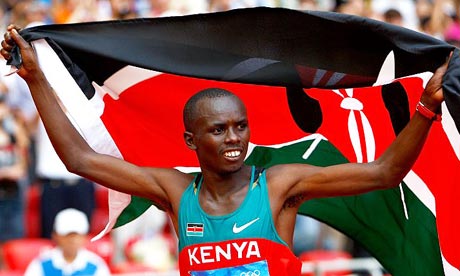By Jonathan Beverly
Isaac Macharia, childhood friend and current training partner of Sammy Wanjiru, tells a story about the Olympic champion.
"Two to three years back," Macharia recalls, "before he was very good, he told me, 'I want to buy a big car -- the biggest in Kenya.' I said, 'You're too young!' But now, he has a big car: a Toyota Land Cruiser." Macharia says Wanjiru has always been like that: He is very focused, he has confidence, he knows what he wants. Though he stands only 5 feet, 4 inches tall and weighs 112 lbs., Wanjiru has always dreamed big.
Macharia was there when Wanjiru dreamed his biggest accomplishment to date. It was the night before the December 2007 Fukuoka marathon, Wanjiru's debut at the distance. Macharia had flown in from Kenya to be a pacemaker, and that night they sat down and "talked a lot of time," says Macharia. Wanjiru wanted to be the greatest runner in Kenya, and together they decided that winning a gold medal in the marathon would be the way to become that, as a Kenyan had never done so. That night, they decided to "plan for it." When Wanjiru plans for something, Macharia says, he usually gets it.
As everyone now knows, Wanjiru disposed of the field in Beijing like the Terminator, which he claims is his favorite movie, not only winning, but running an Olympic record in the Beijing heat, in what many have called the best marathon ever. He has indeed become, as he had predicted, arguably the greatest Kenyan marathoner ever.
Planning to win a gold medal was hardly the first audacious act in the life of Wanjiru. At age 15, he made his first trip to Nairobi from his home in rural Nyahururu -- Kenya's highest major town, at 7,555 feet on the east side of the Rift Valley, about 120 miles north of the capital -- to run in a cross country championship. There, he placed third, and was approached by Shunichi Kobayashi, a somewhat shadowy figure who acts as a scout and recruiter for Japanese high schools. Wanjiru believes he was approached because of his running style: With short legs, quick turnover and upright posture, he resembles a Japanese runner more than his long-striding compatriots. When Kobayashi asked if Wanjiru would come to Japan, Wanjiru recalls, "I told him, 'Me, I don't know where Japan is.' " Returning to Nyahururu, he talked with his mother about the offer. Kobayashi also came to his home and explained it to his mother. "The thing was, it was very hard for my Mum," Wanjiru recalls. "There was no money to send me to high school. My Mum was thinking this was a good chance." A few weeks later, in March 2002, he was back in Nairobi boarding a plane with Kobayashi -- his first time on an airplane -- first to Switzerland, then to Narita, where Kobayashi put him on the Shinkansen bullet train for the two-hour ride north to Sendai.
Whenever one crosses cultures, the first day feels like a week, the first week a month. The memories of those fish-out-of-water days are etched on one's memory forever. Wanjiru's memories are cold, dark and lonely. "It was really hard," he recalls, "for the first year, to learn the Japanese language. And the food, it is very different. And you must use the chopsticks, not the spoon -- starting the first day. It was really hard." He had never seen snow, never experienced winter.
Fortunately he had his running, which took the majority of his time, and friends from the UK and Germany in the "foreigners class" where they studied Japanese for three months, before entering normal classes a monthly salary working for Toyota, officially in marketing, with duties to appear at events, on TV and the like, and to work in the office for four hours twice a week. The work, however, was minimal and easy, Wanjiru says, making clear that "the hard work is running."
Wanjiru liked and respected Morishita. "He gave me a good training," Wanjiru says. "He helped improve my time." Wanjiru broke the world record in the half marathon, trained and raced with the Japanese team, and won his first marathon. "It is a good life," Wanjiru says of his time in Japan. If a 15-year-old Kenyan asked him today if he should take a similar opportunity to go to Japan, he would recommend it.
In July 2008, however, Wanjiru sent a letter to Toyota, resigning from the team. As good as the life was in Japan, his home was in Kenya. He preferred training in Kenya, he had found enough time at home to marry a wife and have a child there (with another on the way), and he chafed at the 180-days-in-country rule of the Japanese corporate teams as well as the control that the team and coach had over him. Toyota had reportedly blocked his entry into New York in the fall of 2007, and following Wanjiru's course record debut in Fukuoka, Morishita had publicly stated that he didn't think Wanjiru should run London or the Olympics the following year.
"I needed to train more; I needed time to go to Kenya; I wanted to go to Olympics for my country," Wanjiru says regarding his decision. "In Kenya there are hills and high altitude, that is the part of my training that has been missing."
In Kenya, he splits his time between homes in Nyahururu and Ngong, a wealthy suburb on the outskirts of Nairobi, made famous by Karen Blixen's Out of Africa and still popular with expatriates as well as successful Kenyans. When asked if he's become one of the wabenzi -- Swahili slang for the upper crust who drive Mercedes-Benz cars -- Wanjiru laughs and says, "No Benz. I like Toyota."
READ ON...





 ShareThis
ShareThis